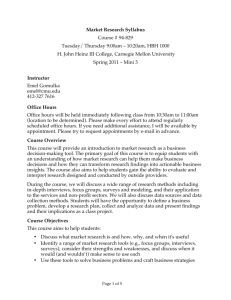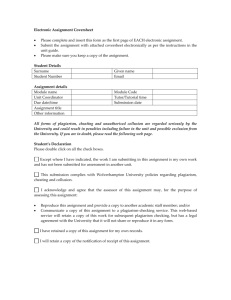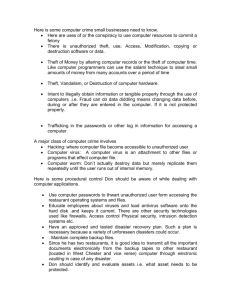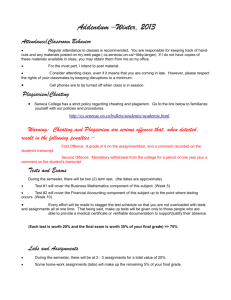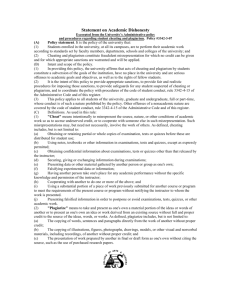Lesson 0.3 Academic Honesty
advertisement
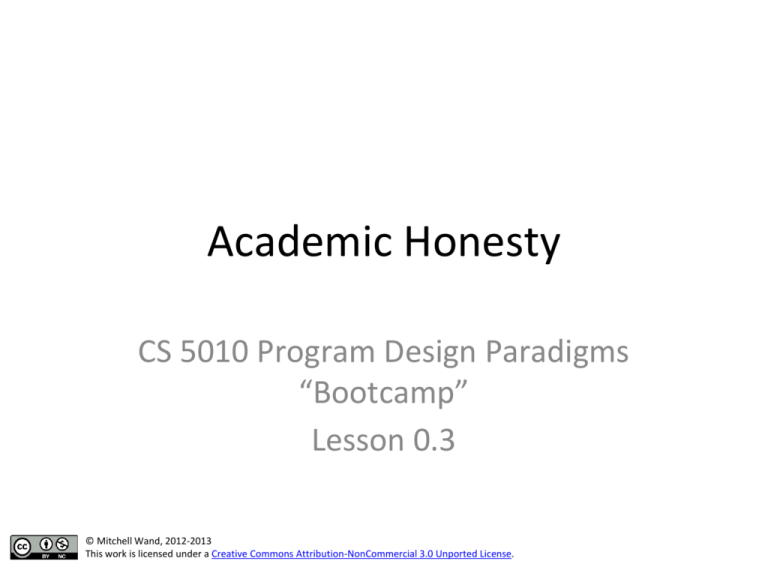
Academic Honesty CS 5010 Program Design Paradigms “Bootcamp” Lesson 0.3 © Mitchell Wand, 2012-2013 This work is licensed under a Creative Commons Attribution-NonCommercial 3.0 Unported License. Why is Academic Honesty Important? ● Your diploma represents the University’s certification that you have attained a certain level of knowledge in your program. ● Your grade in this course represents my certification that you have attained a certain level of knowledge in this course. ● “You” means you, not “you with a little help from your friends.” Who cares? ● Employers care. ○ When they see an NU diploma, they expect that individual to have reached a certain level of achievement ● Faculty and Advisors care. ○ When they see a grade in this course, they expect that individual to have reached a certain level of knowledge. Who else cares? ● Your classmates care. ○ An honest student gets angry when his or her classmate gets a reward without putting in the effort. ● The University cares. ○ Every time a student goes out into the world with an NU diploma and doesn’t perform well, it makes the whole University look bad. CCIS Cheating Policy ● All violations of the University academic integrity policy must be reported to OSCCR. ○ OSCCR = Office of Student Conduct and Conflict Resolution. ● Students who cheat often do so in multiple courses. By reporting all violations to OSCCR, we guarantee that such students are suitably punished. University Academic Integrity Policy The following is a broad overview, but not an all-encompassing definition, of what constitutes a violation of academic integrity. [from OSCCR website] Cheating: The University defines cheating as using or attempting to use unauthorized materials, information, or study aids in any academic exercise. When completing any academic assignment, a student shall rely on his or her own mastery of the subject. [emphasis added] Fabrication: The University defines fabrication as falsification, misrepresentation, or invention of any information, data, or citation in an academic exercise. Plagiarism: The University defines plagiarism as using as one’s own the words, ideas, data, code, or other original academic material of another without providing proper citation or attribution. Plagiarism can apply to any assignment, either final or drafted copies, and it can occur either accidentally or deliberately. Claiming that one has “forgotten” to document ideas or material taken from another source does not exempt one from plagiarizing. Unauthorized Collaboration: The University defines unauthorized collaboration as instances when students submit individual academic works that are substantially similar to one another. While several students may have the same source material, any analysis, interpretation, or reporting of data required by an assignment must be each individual’s independent work unless the instructor has explicitly granted permission for group work. [emphasis added] Participation in Academically Dishonest Activities: The University defines participation in academically dishonest activities as any action taken by a student with the intention of gaining an unfair advantage over other students. The Short Version: DON'T SHARE BITS If you share files or even portions of files with somebody else, we will detect it and you will get sent to OSCCR. Period. End of story. Typical scenarios (1) ● Your friend comes and says that he or she is lost and the problem is due tomorrow, and can he just please look at your solution, or your data definitions, or even just your test cases. • • What should you do? Tell him that the University policy requires that you tell him "no." If you give him or her your files, you will be sent to OSCCR. (And of course he will be sent to OSCCR.) Typical scenarios (2) • • • • • The problem is due tomorrow and your roommate has solved the problem and has left his machine unlocked, but you are still struggling. You think: I’ll just take a peek at his solution And then you think: I’ll mail myself a copy so I can look at it more closely What should you do? DON'T DO IT: you WILL be sent to OSCCR (and your punishment may be harsher: theft is much worse than collaboration.) Typical scenarios (3) • • • • You are sitting in the library with a group of people and you write some test cases on the whiteboard. And then you all submit the same test cases, maybe with the numbers changed. What happens next? You all will be sent to OSCCR. What happens if I get caught? ● You will get called to my office and I will show you what you did. ● You will receive a grade penalty in the course. ● You will be sent to OSCCR. ○ They will assign a non-academic penalty (typically some form of suspension, possibly deferred if there are no future violations) ○ A second OSCCR violation typically results in expulsion from the University. ■ I have seen this happen! What happens if I don’t get caught? ● You go on to the next course, and do poorly because you are unprepared ● You go out on an interview, and do poorly because you are unprepared ● You manage to get a job, but do poorly because you are unprepared. ● Your co-op employer is so disappointed by your performance that he decides not to interview any more NU students. Avoiding Problems (1) ● Students typically report that this course requires about 20 hours of work per week, so budget your time accordingly. ● We know that students who are under time pressure are far more likely to resort to theft. ● Time pressure or stress is not an acceptable excuse. ● The measure of character is not what you do when things are easy; it is what you do when things get tough. Avoiding Problems (2) ● Guard your work! ● If you keep your work on your home machine, be sure your machine is secure, both from Internet hostiles and from your roommates, etc. ○ It only takes a minute for your roommate, or for the person sitting next to you in the hallway, to stick a USB drive in your machine and steal your work. ● Don't discount this; we have encountered theft by roommates on a regular basis in the past. ○ Remember that physical security is a prerequisite for information security. Sorry about that... ● I know that most of you are honest, and none of this will apply to you ● BUT cheating happens often enough that we need to have policies about it, and you need to know them. ● If you have any questions about any actions that you have done or are thinking about, please come talk to the course staff immediately. ● You can send me a private message on Piazza.
